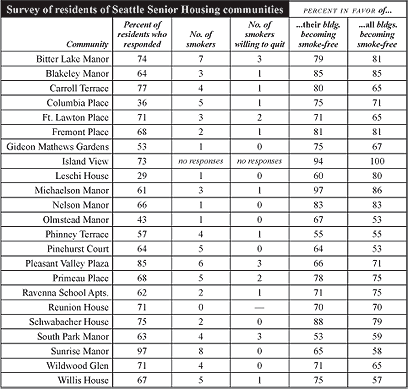 SEATTLE—October 28, 2009—A recent survey of residents in Seattle Senior Housing Program buildings indicates that a significant majority of the program's residents would like to see their buildings become smoke-free facilities.
SEATTLE—October 28, 2009—A recent survey of residents in Seattle Senior Housing Program buildings indicates that a significant majority of the program's residents would like to see their buildings become smoke-free facilities.
The survey was undertaken after Judith Anderson, the program's senior manager, heard numerous complaints from residents about the effects of second-hand smoke.
"We get lots of complaints about neighbors' smoking," Anderson said recently. "People are worried about second-hand smoke in general, and residents who have asthma or other medical conditions are particularly worried."
In response to these complaints, this summer Anderson visited every one of the program's 23 buildings for informal discussions about smoking. She said the discussions were very well attended, and that residents were free with their opinions. Mostly she heard from non-smokers who expressed concerns about the effects of second-hand smoke.
Anderson followed up with a survey sent to every resident of the Senior Housing program. The results of that survey, which had a high response rate, are summarized in the accompanying table.
Results indicate that most SSHP residents would like their buildings to go smoke-free—and even more would like all the buildings in the program to be smoke-free. Many of the self-identified smokers—more than a quarter of them—said that they are willing to give up smoking.
The health of residents in these buildings is her chief concern, Anderson said. However, she also pointed out that, from a manager's perspective, apartments that need to be prepared for a new tenant after a smoker moves out are much more expensive to clean and prepare than nonsmokers'.
Anderson will brief the housing authority's Board of Commissioners on this issue in the near future.
One Seattle Senior Housing resident, Nan McMurry, 71, who has lived in a one-bedroom apartment in Fort Lawton Place for three years, is entirely in favor of her building's going non-smoking, and would like to see Seattle Senior Housing adopt a no-smoking policy. She said that although she isn't all that bothered by the smell of smoke ("People are very discreet about their smoking," in her building, she said), there's a very good reason why smoking should be banned: to better the health of smokers.
"I know the smokers in my building," she said recently, "and I've seen their health deteriorate from smoking, and so if only for their sake a no-smoking policy would be a very good thing–it would force them to quit.
Some smokers don't understand how smoking in their apartments can possibly bother their neighbors, especially if they keep their windows closed.
Dan Morris, a senior indoor air quality consultant for a Bellevue business called EHSA International-Healthy Buildings, has recently investigated complaints about second-hand smoke from some 20 condominium owners and apartment-building tenants. To Morris, the problem is simple: Smoke migrates.
"Smoke rises with heat," he said last month. "It leaks through plumbing and wiring penetrations and even through air spaces below and above walls. Apart from non-smokers who actually live with smokers, the people who live in a unit above a smoker's unit are at the greatest risk of the health problems from second-hand smoke, but actually so is everybody who lives near a smoker's apartment."
Study after study has made it clear that second-hand smoke is very dangerous, particularly to elderly people, people with allergies, and people who are ill. (Second-hand some is defined as tobacco smoke that people near someone who is smoking have to breathe.) Citing this fact among others, the U.S. Department of Housing and Urban Development recently sent all public housing authorities a strong recommendation that they make their buildings smoke-free.
Any proposed change in policy affecting SSHP's smoking residents and their nonsmoking neighbors will involve further conversation with residents, managers and the Board.
